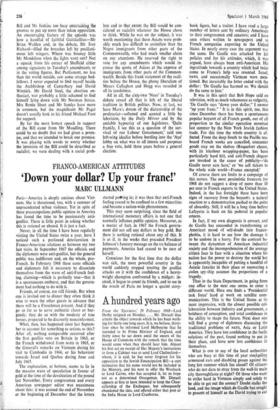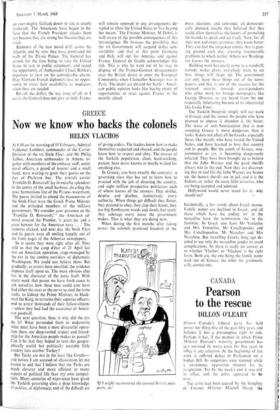`Down your dollar? Up your franc!'
FRANCO-AMERICAN ATTITUDES MARC ULLMANN
Paris—America is deeply anxious about Viet- nam. She is threatened, too, with a summer of unprecedented urban violence. Yet in spite of these preoccupations public opinion in America has found the time to be passionately anti- gaullist. There is little point in asking whether this is rational or absurd. It is just a fact.
Never, in all the time I have been regularly visiting the United States twice a year, have I noticed such a profound deterioration in Franco-American relations as between my two last visits. In September 1967 the officials and the diplomats were anti-gaullist, but the general public was indifferent and, on the whole, pro- French. In February 1968 these same officials and diplomats felt it necessary to dissociate themselves from the wave of anti-French feel- ing, claiming—which is perfectly true—that it is a spontaneous outburst, and that the govern- ment had nothing to do with it.
Friends, of course, are still friends. But when one is invited out to dinner they often think it wise to warn the other guests in advance that there will be a Frenchman present. And if they go so far as to serve authentic claret or bur- gundy, they do so with the modesty of true heroes, prepared to be discreetly nonconformist.
What, then, has happened since last Septem- ber to account for something as serious as this? After all, nothing comparable occurred after the first gaullist veto on Britain in 1963, or the French withdrawal from NATO in 1965, or the General's remarks on Vietnam during his visit to Cambodia in 1966, or his behaviour towards Israel and Quebec during June and July 1967.
The explanation, at bottom, seems to lie in the massive wave of speculation in favour of gold at the time of the devaluation of the pound last November. Every congressman and every American newspaper editor was unanimous about this: it was around the end of November or the beginning of December that the letters started pouring in; it was then that anti-French feeling ceased to be confined to a few minorities and became a nation-wide phenomenon.
This may seem surprising, since the field of international monetary affairs is not one that normally inflames public opinion. Moreover, as a matter of fact, in 1967 the French govern- ment did not sell any dollars to buy gold. But there is nothing rational about any of this. It is as if, in the weeks that preceded President Johnson's January message on the us balance of payments, America had ceased to be sure of herself.
Conscious for the first time that the dollar was sick, the most powerful country in the world suddenly stopped treating the gaullist attacks on it with the confidence of a heavy- weight champion confronted by a midget: in- stead, it began to count its friends, and to see in the oracle of Paris no longer a quaint story- book figure, but a traitor. I have read a large number of letters sent by ordinary Americans to their congressmen and senators; and I have seen others written to newspapers and to French companies exporting to the United
States. In nearly every case the argument was the same. De Gaulle was attacked for his policies and for his attitudes, which, it was
argued, have always been anti-American. His ingratitude towards a country which had twice come to France's help was resented. Israel,
NATO, and occasionally Vietnam were men- tioned. But invariably the letter ended with the dollar: 'De Gaulle has harmed us. We should do the same to him.'
It was in this spirit that Bob Hope said on television, with as much vehemence as vulgarity, `De Gaulle says "down your dollar." I answer "up your franc." ' It is in this spirit, too, that since December there has been a spontaneous popular boycott of all French goods, out of all proportion to the similar operation mounted last summer by the New York Jewish fashion trade. For this time the whole country is af- fected. From the deep South to the Pacific sea- board French weeks are cancelled, consumer goods stay on the shelves (Roquefort cheese, with its tricolour wrapping-paper, has been particularly hard hit), and anti-French slogans are invoked in the cause of publicity—`de Gaulle never eats here,' or 'we sell tickets to the whole wide world—France excepted.'
Of course there are limits to a campaign of this nature. The most pessimistic forecasts for 1968 do not suggest a drop of more than 10 per cent in French exports to the United States. Indeed, in the last fortnight there have been signs of recovery from the boycott: a natural reaction to a demonstration pushed to the point of absurdity. Still, it will be a long time before Lafayette is back on his pedestal in popular esteem.
In fact, if my own diagnosis is correct, and de Gaulle has succeeded in transforming an American mood of self-doubt into franco- phobia, it is hard to see how the damage is to be undone in a hurry. For the contrast be- tween the dynamism of American industrial society and the incomprehension of the average citizen face to face with a situation where his nation has the power to destroy the world but is apparently incapable of putting a handful of Asiatic fanatics in their place or recovering a stolen spy-ship assumes the proportions of a tragedy.
Thus in the State Department, in going from one office to the next one seems to enter a different world. Here one finds a 'Presidential task force' hard at work on satellite com- munications. This is the United States at its most impressive, with the closest possible col- laboration between industry and government, a boldness of conception, and total confidence in the ability to shape the future. Next door one
will find a group of diplomats discussing the traditional problems of NATO, Asia or Latin
America. They have lost confidence in the facile solutions of the past, found nothing to put in their place, and have now lost confidence in themselves.
What is one to say of the local authorities who are busy at this time of year stockpiling armoured cars and disabling gasses against the long hot summer which lies ahead? Of citizens who do not dare to stray from the well-lit main city thoroughfares at night? Of those who want to strike hard in Vietnam simply and solely to be able to get out the sooner? Doubt stalks the land, and the image which de Gaulle has sought to present of himself as the David trying to cut an over-mighty Goliath down to size is utterly irrelevant. The Americans have begun to be- lieve that the French President attacks them not because they are strong but because they are weak.
Rumours of the new mood drift across the Atlantic, and by now they have penetrated the walls of the Elysee Palace. The General has ceased, for the time being, to take the United States to task in public statements, and seized the opportunity of Ambassador Chuck Bohlen's departure to turn on his considerable charm. Over Vietnam French diplomats' lose no oppor- tunity to stress their availability as mediators %Olen they are needed.
But on the dollar, the key issue of all, as I see it, the General does not give an inch. France will remain opposed to any arrangements de- signed to allow the United States to `live beyond her means.' The Finance Minister, M Debre, is well aware of the possible consequences of this intransigence. He foresees the possibility that the us Government will suspend dollar con- vertibility and that at this point Germany and Italy will opt for America and against France. General de Gaulle acknowledges this risk. This is why he went out of his way to dispose of the Franco-German disagreements over the British desire to enter the European Community when Chancellor Kiesinger was in Paris. The decks are cleared for battle : Ameri- can public opinion looks like having plenty of opportunities to react against France in the months ahead.



































 Previous page
Previous page